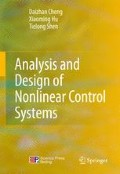Abstract
As the simplest hybrid system a switched system has many industrial backgrounds and engineering applications. Theoretically, it is also challenging: Switching adds complexity, and at the same time provides more freedom for control design. This chapter considers switched affine (control) systems. Section 15.1 investigates the problem of common quadratic Lyapunov function. It provides a tool for stability analysis and stabilization of switched linear systems. Section 15.2 gives a necessary and sufficient condition for quadratic stabilization of planar switched linear systems. Controllability of switched linear and bilinear control systems are studied in Sections 15.3 and 15.4 respectively. As an application, Section 15.5 considers the consensus of multi-agent systems.
Access this chapter
Tax calculation will be finalised at checkout
Purchases are for personal use only
Preview
Unable to display preview. Download preview PDF.
References
Bacciotti A, Mazzi L. An invariance principle for nonlinear switched systems. Sys. Contr. Lett., 2005, 54(11): 1109–1119.
Bhattacharyya S, Chapellat H, Keel L. Robust Control: The Parametric Approach. New Jersey: Prentice Hall, 1995.
Branicky M. Multiple Lyapunov functions and other analysis tools for switchedand hybrid systems. IEEE Trans. Aut. Contr., 1998, 43(4): 475–482.
Cheng D. Stabilization of planar switched systems. Sys. Contr. Lett., 2004, 51(2): 79–88.
Cheng D. Controllability of switched bilinear systems. IEEE Trans. Aut. Contr., 2005, 50(4): 511–515
Cheng D, Lin Y, Wang Y. Accessibility of switched linear systems. IEEE Trans. Aut. Contr., 2006, 51(9): 1486–1491.
Cheng D, Wang J, Hu X. An extension of LaSalle’s invariance principle and its application to multi-agent consensus. IEEE Trans. Aut. Contr., 2008, 53(7): 1765–1770.
Dayawansa W, Martin C. A converse Lyapunov theorem for a class of dynamic systems which undergo switching. IEEE Trans. Aut. Contr., 1999, 44(4): 751–760.
Fax A, Murray R. Information flow and cooperative control of vehicle formations. IEEE Trans. Aut. Contr., 2004, 40(9): 1453–1464.
Godsil C, Royle G. Algebraic Graph Theory. New York: Springer-Verlag, 2001.
Hespanha J. Uniform stability of switched linear systems: Extensions of LaSalle’s Invariance Principle. IEEE Trans. Aut. Contr., 2004, 49(4): 470–482.
Hong Y, Gao L, Cheng D, et al. Coordination of multi-agent systems with varying interconnection topology using common Lyapunov function. IEEE Trans. Aut. Contr., 2007, 52(5): 943–948.
Hong Y, Hu J, Gao L. Tracking control for multi-agent consensus with an active leader and variable topology. Automatica, 2006, 42(7): 1177–1182.
Horn R, Johnson C. Matrix Analysis. New York: Cambbridge Univ. Press, 1985.
Humphreys J. Introduction to Lie Algebras and Representation Theory, 2nd edn. New York: Springer-Verlag, 1970.
Jurdjevic V, Sallet G. Controllability properties of affine systems. SIAM J. Contr. Opt., 1984, 22(3): 501–508.
Khalil H. Nonlinear Systems, 3rd edn. New Jersey: Prentice Hall, 2002.
Liberzon D, Hespanha J, Morse A. Stability of switched systems: Lie-algebraic condition. Sys. Contr. Lett., 1999, 37(3): 117–122.
Mohler R. Nonlinear Systems, Volume II, Applications to Bilinear Control. New Jersey: Prentice Hall, 1991.
Narendra K, Balakrishnan J. A common Lyapunov function for stable LTI systems with commuting A-matrices. IEEE Trans. Aut. Contr., 1994, 39(12): 2469–2471.
Olfati-Saber R, Murray R. Consensus problems in networks of agents with switching topology and time-delays. IEEE Trans. Aut. Contr., 2004, 49(9): 1520–1533.
Qiao Y, Cheng D. On partitioned controllability of switched linear systems Automatica, 2009, 41(1): 225–229.
Rugh W. Linear Systems Theory. New Jersey: Prentice-Hall, 1993.
Sun Z, Ge S, Lee T. Controllability and reachability criteria for switched linear systems. Automatica, 2002, 38(5): 775–786.
Susmann H. A general theorem on local controllability. SIAM J. Contr. Opt., 1987, 25(1): 158–194.
Vidyasagar M. Nonlinear Systems Analysis. New Jersey: Prentice Hall, 1993.
Wang J, Cheng D, Hu X. Consensus of multi-agent linear dynamic systems. Asian J. Contr., 2008, 10(2): 144–155.
Author information
Authors and Affiliations
Rights and permissions
Copyright information
© 2010 Science Press Beijing and Springer-Verlag Berlin Heidelberg
About this chapter
Cite this chapter
Cheng, D., Hu, X., Shen, T. (2010). Switched Systems. In: Analysis and Design of Nonlinear Control Systems. Springer, Berlin, Heidelberg. https://doi.org/10.1007/978-3-642-11550-9_15
Download citation
DOI: https://doi.org/10.1007/978-3-642-11550-9_15
Publisher Name: Springer, Berlin, Heidelberg
Print ISBN: 978-3-642-11549-3
Online ISBN: 978-3-642-11550-9
eBook Packages: Mathematics and StatisticsMathematics and Statistics (R0)

